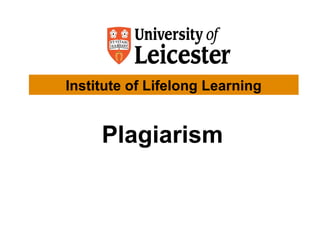
Plagiarism Guide
- 1. Plagiarism Institute of Lifelong Learning
- 2. Plagiarism is… 1. Plagiarism is about copying or acquiring the work of others and, directly or indirectly, claiming it to be your own independent and original work.
- 3. Plagiarism is also about: 2. Summarizing or paraphrasing another person’s original idea, research, theory or practice without acknowledging the source. If you do not acknowledge the source you, in effect, imply that it is your idea when it is not.
- 4. …and about: 3. colluding with other students and submitting identical or near identical work; or allowing other students to copy all or part of your work.
- 5. University Regulations: “A dissertation, thesis, essay, project or any other work which is not undertaken in an examination room under supervision but which is submitted by a student for formal assessment must be written by the student and in the student’s own words, except for quotations from published and unpublished sources which shall be clearly indicated and acknowledged as such…”
- 6. Why students plagiarise • Student A thought it was discourteous to rewrite an author’s words, as that author was well-known & respected writer; • Student B was worried his command of English; he thought the author’s English was better so copied this; • Student C had plagiarised from the internet, as he thought that copying from books was wrong, but that copying from internet was acceptable; • Student D had been encouraged by her tutors in her home country to copy work without citing sources so thought it acceptable in Britain. However, this doesn’t make it right; it is still plagiarism!
- 7. I In Britain plagiarism is a serious academic offence, because: • We feel you should acknowledge, respect and honour another person’s hard work and effort; you do this by using references in assignments. • Our aim is to encourage you to think independently; summarising or paraphrasing the ideas of others (and acknowledging them) is an important step toward this goal.
- 8. University education is about.. • reading the ideas of others • analysing, criticising and applying the ideas of others • but it is also about encouraging you to think for yourself and develop your own ideas.
- 9. How to avoid plagiarism (a) Always try to summarize in your own words (or by paraphrasing) another person’s work , and give acknowledgement to that person in your assignment. This is done by citing your sources and giving full references, or…
- 10. How to avoid plagiarism (b) …by using quotation marks in your assignments to distinguish between your words and the words copied directly from a source. Once again, you would give cite your sources in your assignment and give a full reference at the end of an assignment.
- 11. How to avoid plagiarism (c) • Don’t allow other students to copy (fully or partially) your work • Don’t copy (fully or partially) other students’ work
- 12. Summarising other people’s ideas can be difficult… • …particularly if English is not your first language, and/or • you feel the author’s way of expressing ideas is better than yours, and/or • the words used by an author are difficult to alter or change
- 13. However, you should… • …try to present other people’s ideas as best you can using your own words. • Lecturers will take into account that English may not be your first language when marking your work.
- 14. Plagiarism can be detected • Electronically – software can highlight something that has been copied, or partially copied, from an electronic or printed source. • By lecturers – lecturers can recognise when something has been copied or partially copied, as they are experienced in reading student assignments, and plagiarism stands out!
- 15. So, don’t do it! • Plagiarism is treated seriously by universities in Britain - you could fail a module or a course.
- 16. Referencing • The way to avoid plagiarism is to always give the source of other people’s ideas/practices that you refer to in your assignments • We use the HARVARD SYSTEM of referencing in the Institute of Lifelong Learning.
- 17. Institute of Lifelong Learning